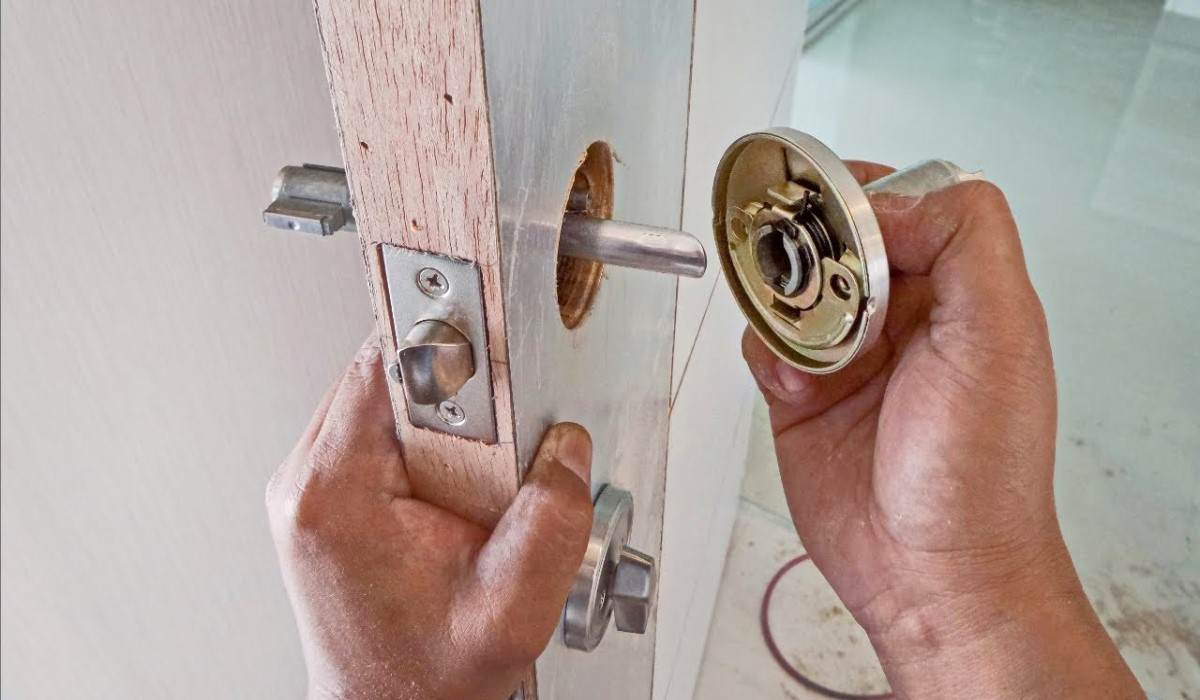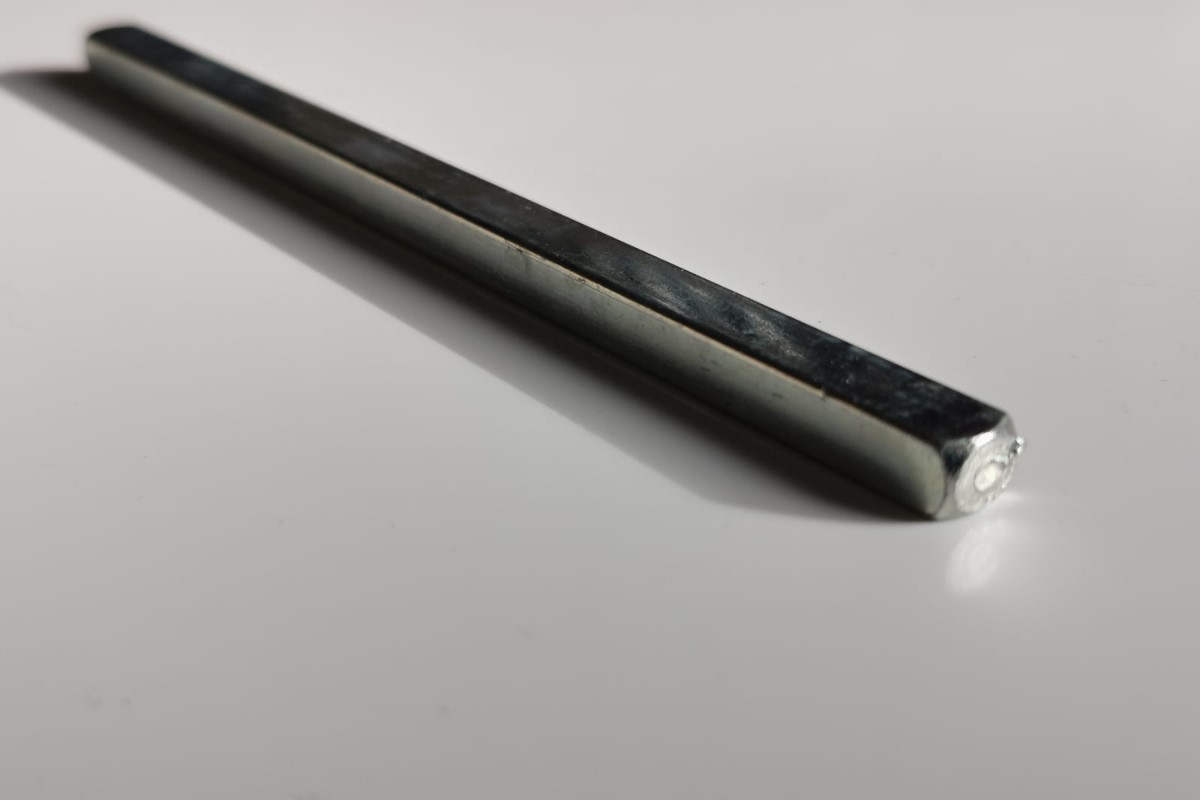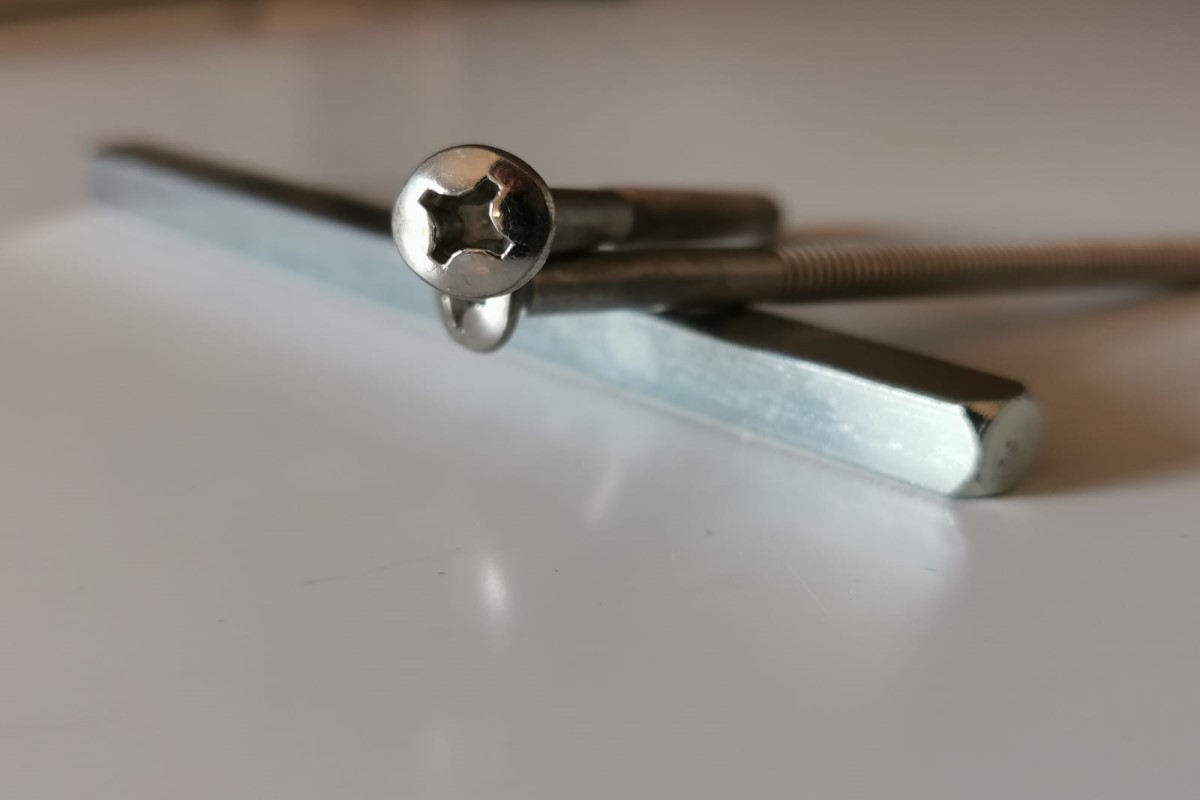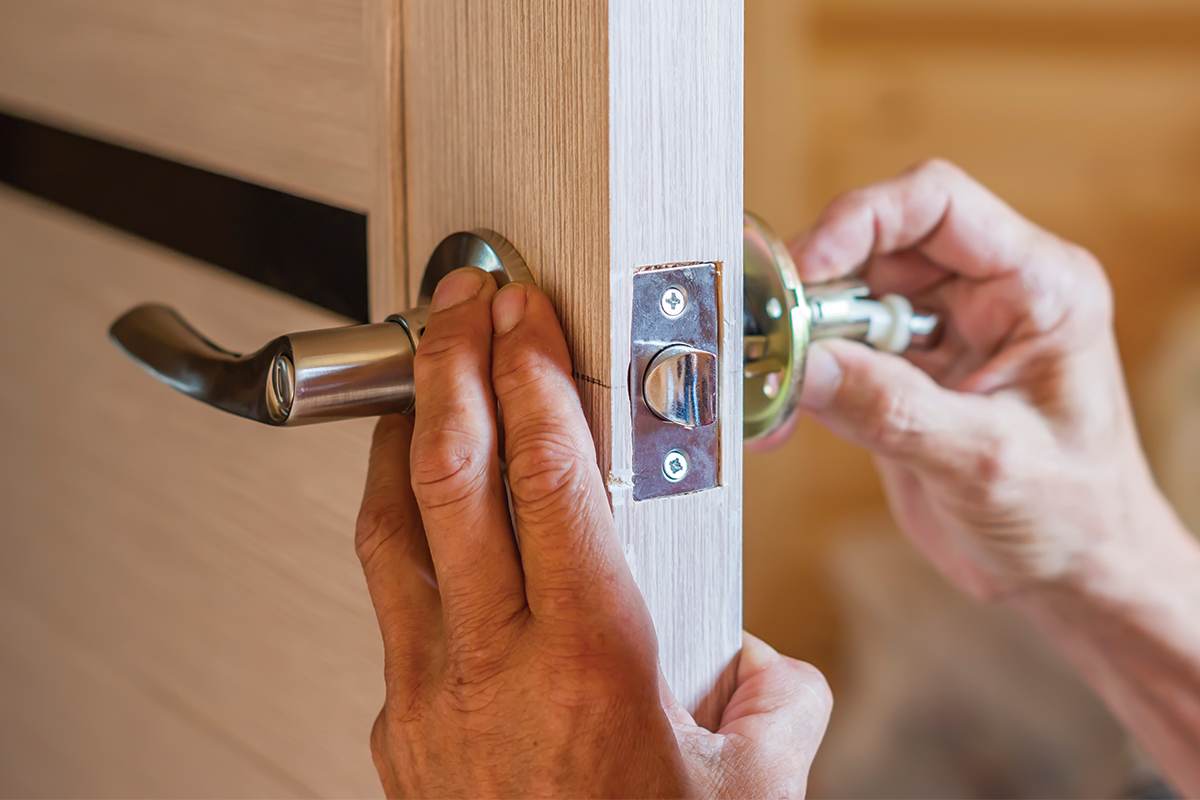A spindle, which joins two door handle types or door knobs on each side of a door, is a length of square metal rod or bar that is often made of steel. A set of door handles or door knobs have square holes on the back that the spindle fits into. It is received by the follower* (spindle hole) on a mortise lock or tubular latch. The spindle spins and activates the latch within the door when the levers on a set of door handle sets are manually depressed or the door knob is twisted. The latch bolt, often referred to as the latch tongue, is retracted as a result, allowing the door to open. A door handle spindle's cross-section thickness is now 8mm (5/16), which is the industry standard "square (). The size of current spindles has evolved to fit this spot.  However, it should be recalled that spindles and followers weren't always 8mm standard. Before the metric system was adopted, spindles were often produced at 19/64 of an inch ", which is equivalent to 7.6mm. Even spindles as little as 7mm were used to make certain locks made before the turn of the 20th century, and on occasion, even smaller spindles have been discovered. Because a contemporary 8mm spindle will not fit through a smaller-sized follower, it might be challenging to replace a spindle or the Door Handles or Door Knobs on an old latch or lock. It is usually excellent practice to measure the follower or spindle on your current latches, locks, and handles to avoid annoyance when replacing outdated door handles. Spindles for door handles may vary in length in addition to their thickness. The most typical spindle length included with door handles and knobs is 100mm (4"), which is long enough to fit into the rear of any door handle or knob and is also wide enough to pass through any standard-thickness doors, including fire doors. Sometimes a door that is very thick may need a spindle that is longer than the usual 100mm spindle. We advise constantly checking door thickness while changing door furnishings because of this. A longer spindle could be required for doors that are thicker than 45mm. In this case, you might purchase longer spindles and use a hacksaw to reduce them to the appropriate size for your needs. Extra-long spindles are available from us in a variety of sizes and designs. When used on very thin internal doors, new spindles included with door furniture sometimes have a tendency to be overly lengthy at first. In this case, all that is required is to clamp the spindle in a vice and hacksaw off the excess.
However, it should be recalled that spindles and followers weren't always 8mm standard. Before the metric system was adopted, spindles were often produced at 19/64 of an inch ", which is equivalent to 7.6mm. Even spindles as little as 7mm were used to make certain locks made before the turn of the 20th century, and on occasion, even smaller spindles have been discovered. Because a contemporary 8mm spindle will not fit through a smaller-sized follower, it might be challenging to replace a spindle or the Door Handles or Door Knobs on an old latch or lock. It is usually excellent practice to measure the follower or spindle on your current latches, locks, and handles to avoid annoyance when replacing outdated door handles. Spindles for door handles may vary in length in addition to their thickness. The most typical spindle length included with door handles and knobs is 100mm (4"), which is long enough to fit into the rear of any door handle or knob and is also wide enough to pass through any standard-thickness doors, including fire doors. Sometimes a door that is very thick may need a spindle that is longer than the usual 100mm spindle. We advise constantly checking door thickness while changing door furnishings because of this. A longer spindle could be required for doors that are thicker than 45mm. In this case, you might purchase longer spindles and use a hacksaw to reduce them to the appropriate size for your needs. Extra-long spindles are available from us in a variety of sizes and designs. When used on very thin internal doors, new spindles included with door furniture sometimes have a tendency to be overly lengthy at first. In this case, all that is required is to clamp the spindle in a vice and hacksaw off the excess.  If you decide to do this, carefully measure the spindle, taking into account the length required to fit into the back of the two-door handles. If this is measured properly, cutting the spindle too short won't happen. Do all door handles and door knobs fit a certain kind of spindle? Sadly, it is not the solution. Although 8mm square spindles are the current industry standard, there are many alternative kinds of spindles available to suit various door furniture requirements. Let's examine some of the spindle kinds that are most often used. when the door furniture is face-fixed* to the door in these circumstances. When a door handle or knob is face-fixed to a door, the pulling force is transmitted to the backplate or rose on the door furniture rather than the spindle, therefore no further grasping of the spindle is necessary. Right through at both ends, with a 'trough' grooved out around the groove. The groove's function is to accommodate a grub screw**, which locates in the groove after threading through a hole in the shaft of the door handle or door knob. When handles use bolt-through fixes rather than face-fixings, the grub screw wedges into the groove and widens the spindle to provide a highly secure fixing. Spindle The threaded spindle is typically used on door knobs, particularly on furniture with rim knobs. To allow for the most adjustability, the threaded spindle may be threaded at both ends, or it may be threaded at one end with a door knob permanently attached to the other.
If you decide to do this, carefully measure the spindle, taking into account the length required to fit into the back of the two-door handles. If this is measured properly, cutting the spindle too short won't happen. Do all door handles and door knobs fit a certain kind of spindle? Sadly, it is not the solution. Although 8mm square spindles are the current industry standard, there are many alternative kinds of spindles available to suit various door furniture requirements. Let's examine some of the spindle kinds that are most often used. when the door furniture is face-fixed* to the door in these circumstances. When a door handle or knob is face-fixed to a door, the pulling force is transmitted to the backplate or rose on the door furniture rather than the spindle, therefore no further grasping of the spindle is necessary. Right through at both ends, with a 'trough' grooved out around the groove. The groove's function is to accommodate a grub screw**, which locates in the groove after threading through a hole in the shaft of the door handle or door knob. When handles use bolt-through fixes rather than face-fixings, the grub screw wedges into the groove and widens the spindle to provide a highly secure fixing. Spindle The threaded spindle is typically used on door knobs, particularly on furniture with rim knobs. To allow for the most adjustability, the threaded spindle may be threaded at both ends, or it may be threaded at one end with a door knob permanently attached to the other.  Since the door handle should be threaded up the spindle for a number of turns, the threaded spindle offers a particularly secure fixing for doorknobs. Additionally, it offers a highly adaptable fixing since the door knob may be threaded exactly far enough up the spindle on either side. We are able to provide threaded spindles, however, they come in a wide variety of imperial and metric, fine and coarse threads. Therefore, if you want a threaded spindle, we urge you to get in touch with us so we can go through your needs. Along the length of its shaft, there are several holes that have been bored and threaded. The long grub screw, which fits in the threaded holes, is intended to be used with the drilled spindle. The spindles' pre-set drilled intervals create pre-set junctures at which the handle can be secured, making for a slightly less accurate fitting against the door while still offering a very secure fixing right through the spindle. Because of this, the drilled spindle has mainly been replaced with the grooved spindle in recent years.
Since the door handle should be threaded up the spindle for a number of turns, the threaded spindle offers a particularly secure fixing for doorknobs. Additionally, it offers a highly adaptable fixing since the door knob may be threaded exactly far enough up the spindle on either side. We are able to provide threaded spindles, however, they come in a wide variety of imperial and metric, fine and coarse threads. Therefore, if you want a threaded spindle, we urge you to get in touch with us so we can go through your needs. Along the length of its shaft, there are several holes that have been bored and threaded. The long grub screw, which fits in the threaded holes, is intended to be used with the drilled spindle. The spindles' pre-set drilled intervals create pre-set junctures at which the handle can be secured, making for a slightly less accurate fitting against the door while still offering a very secure fixing right through the spindle. Because of this, the drilled spindle has mainly been replaced with the grooved spindle in recent years.  A split spindle is a two-part spindle that is linked in the center to allow the two halves to revolve separately. This kind of spindle is most frequently used with a Night Latch to create a system where the internal handle can be used normally but the exterior handle does not operate the latch. Only those with recognized keys may enter since the latch is opened by the key from the outside rather than by the door handles. You will probably need to substitute your latch or lock with a new product if the spindle is smaller than the current standard of 8mm, or you may locate a lever handle with a spindle that is thinner than 8mm. You may probably locate a replacement for your lock or latch by exploring our selection of locks right here since we have the widest selection of locks and latches online.
A split spindle is a two-part spindle that is linked in the center to allow the two halves to revolve separately. This kind of spindle is most frequently used with a Night Latch to create a system where the internal handle can be used normally but the exterior handle does not operate the latch. Only those with recognized keys may enter since the latch is opened by the key from the outside rather than by the door handles. You will probably need to substitute your latch or lock with a new product if the spindle is smaller than the current standard of 8mm, or you may locate a lever handle with a spindle that is thinner than 8mm. You may probably locate a replacement for your lock or latch by exploring our selection of locks right here since we have the widest selection of locks and latches online.
💰 Tenfold your income 💎
